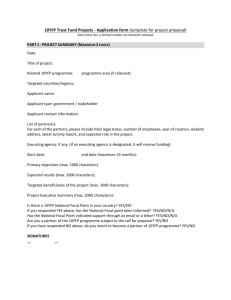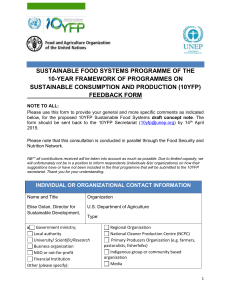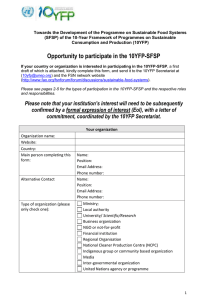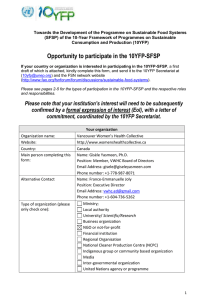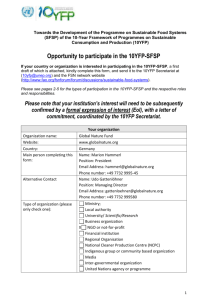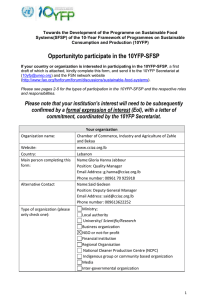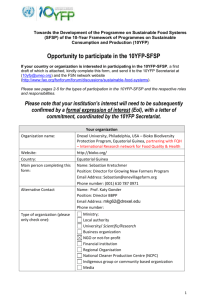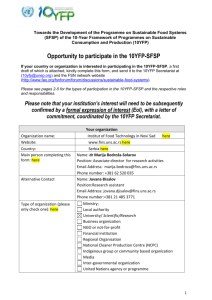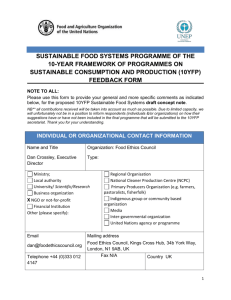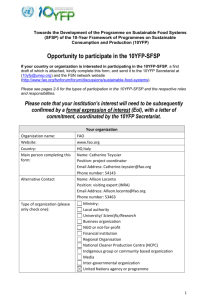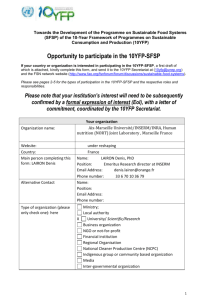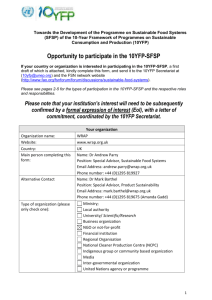Participation_in_SFS_programme_EN_Peralta
advertisement
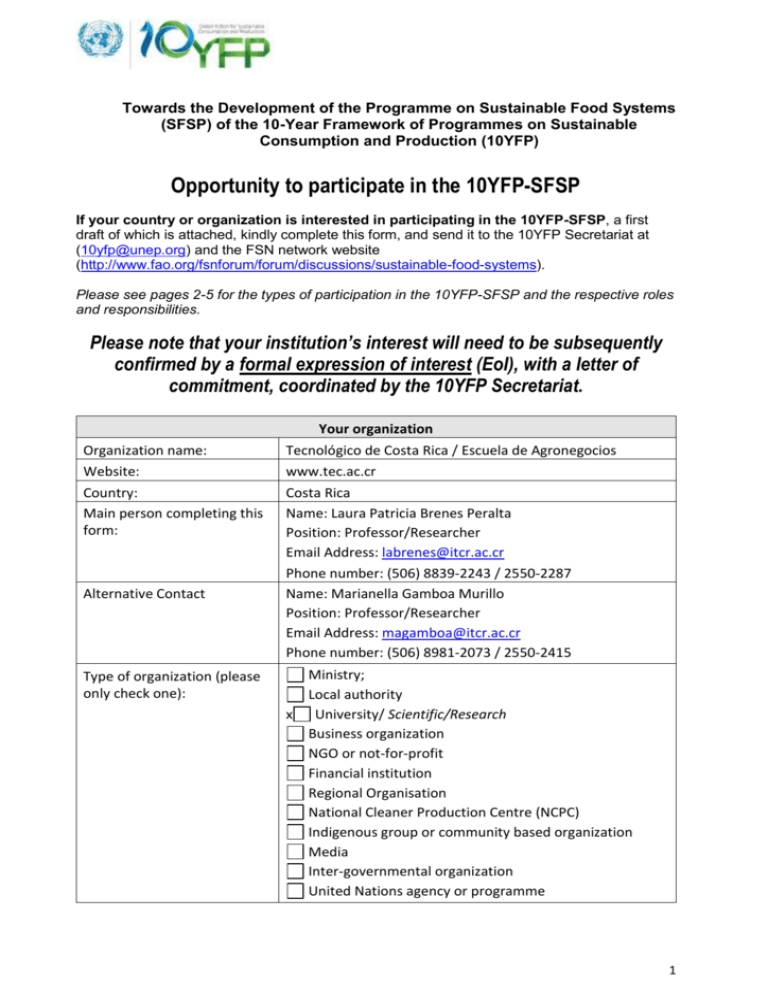
Towards the Development of the Programme on Sustainable Food Systems (SFSP) of the 10-Year Framework of Programmes on Sustainable Consumption and Production (10YFP) Opportunity to participate in the 10YFP-SFSP If your country or organization is interested in participating in the 10YFP-SFSP, a first draft of which is attached, kindly complete this form, and send it to the 10YFP Secretariat at (10yfp@unep.org) and the FSN network website (http://www.fao.org/fsnforum/forum/discussions/sustainable-food-systems). Please see pages 2-5 for the types of participation in the 10YFP-SFSP and the respective roles and responsibilities. Please note that your institution’s interest will need to be subsequently confirmed by a formal expression of interest (EoI), with a letter of commitment, coordinated by the 10YFP Secretariat. Your organization Organization name: Tecnológico de Costa Rica / Escuela de Agronegocios Website: www.tec.ac.cr Country: Main person completing this form: Costa Rica Name: Laura Patricia Brenes Peralta Position: Professor/Researcher Email Address: labrenes@itcr.ac.cr Phone number: (506) 8839-2243 / 2550-2287 Name: Marianella Gamboa Murillo Position: Professor/Researcher Email Address: magamboa@itcr.ac.cr Phone number: (506) 8981-2073 / 2550-2415 Alternative Contact Type of organization (please only check one): x Ministry; Local authority University/ Scientific/Research Business organization NGO or not-for-profit Financial institution Regional Organisation National Cleaner Production Centre (NCPC) Indigenous group or community based organization Media Inter-governmental organization United Nations agency or programme 1 Brief description of your organization (please include objective and main areas of interest) Other (please specify): It is a Tertiary Education Institution with several Departments focused towards teaching, research and extension activities and support for the productive sectors in their search for solutions. The Agribusiness Department particularly, manages an Agribusiness Engineering Major and co-manages a Natural Resources and Production Technologies Masters Degree Program. Our Research proposals are usually based on agriculture and agroindustry activities related to a managing and business scope. We also join this vision to a high level of commitment in sustainable practices and the support for Food Safety and Security polices being implemented in the country and the LAC Region. We have developed research and teaching experiences in several agri-food chains (tomato, coffee, rambutan, dairy, grains, cocoa, tropical fruits, pork, functional foods, composting, among others), as well as in innovation studies in the Region, local market studies, business feasibility, processing practices, among others. We currently hold the coordination position for the SAVE FOOD Costa Rica group through the National Food Loss and Waste (FLW) Reduction Network, together with FAO-CR, and we are members of the Latin America and Caribbean FLW Experts Network, as well as REDISA (network for waste reuse and management-Red Iberoamericana en Gestión y Aprovechamiento de Residuos). We also participate in several boards related to the Ministry of Agriculture, Dairy Chamber, INDER, and others. Please specify your proposed participation in the 10YFP-SFSP Type of proposed Lead actor participation Co-Lead actor x Member of Multi-stakeholder Advisory Committee (MAC) Coordinator of a programme work area x Partner What is your main motivation to be part of the 10YFP-SFSP? Please explain in a few paragraphs I have become more and more aware of the FLW challenges in our production and consumption schemes, which can be considered a transversal issue in almost every area of Agribusinesses due to the multiple effects in economic topics, environmental impact and food safety and security goals. When I began my first consultations for this topic I came across the Sustainable Food Systems programs being developed in Costa Rica by the Ministry of Agriculture and Livestock, as well as to the Think-Eat-Save CAmpaing, and I 2 finally was able to assist to the SAVE FOOD Partnership Event in 2013 which set a clearer view on the status of the problem as well as the needs for solutions. I have found out some solutions are being implemented but they need much more articulation in order to create the expected impact and research, joint activities and collaboration from different disciplines need to become real. Therefore the 10YFP seems like an accurate way of being aware of the proposed routes, to exchange experiences and support (somehow) the direction the Program is aiming to achieve in sustainability production and consumption (from farm to table). How could your country or organization contribute to the development and implementation of the 10YFP-SFSP? We can support the program through awareness rising in our students, as well as by direct research results that have already been obtained, or proposals in a future. There are groups that are working towards the same objectives, therefore we can eventually help facilitate exchange spaces (a place for meetings, seminars, workshops) or linkage to other organizations like the ones active in the FLW Network (SAVE FOOD CR) or REDISA, for example. Please provide a brief description of your efforts in the field of sustainable food systems. As a quick review, I will just mention some of them, hoping to make this list bigger since I have only been active in research for 4 years: -Coordination of the Costa Rican FWL Reduction Network, where I am leading communication, research and alliances sub-committees, and starting formal research for food losses in an institutional restaurant, and 4 agri-food chains: tomato, artisan cheeses, avocado, and leafy vegetables -tomato production systems evaluation (these systems included conventional and alternative production both outside and inside green house experimental facilities) -tomato processing to extend shelf life and take a part of the overproduction volumes in the local market -processing workshops for tomato and blackberry producers -cleaner production lectures in agro-industry activities -composting studies for domestic and municipal waste (trials, marketing proposal for produced composts) -tutoring for students´ proposals related to organic production and organic seed production -scientific consultant group for the National Dairy Congress (2015 and 2014) -member of the organization committes for the National Tomato Congress (2012 and 2014), for the Waste Management Engineering Simposium (http://www.redisa2015.com/#!organizacion/c1zq3) x As the representative of my organization/government, I confirm that the information is correct and true. (official designation as representative pending, formal collaborator since 2009) 3 Date May 6th, 2015 Name Laura Patricia Brenes Peralta Before expressing any interest, please, kindly read carefully the “Guidance document on the 10YFP PROGRAMMES : Criteria, structure and steps to develop and operationalize them”1, which explains the objective and activities of the programme, the different roles available and benefits and responsibilities associated with them. Immediately below you will find a summary of the role and responsibilities of the Lead and Co-leads, Multi-stakeholder Advisory Committee (MAC) members, and Partners of the programme. These will be set out in more detail in the formal Expression of Interest form that you will receive subsequently from the 10YFP Secretariat. ____________________________________________________________________ Role and Responsibilities of the Lead and Co-leads of a 10YFP Programme: Support the overall coordination of the programme implementation and pro-actively fundraise for the programme; Provide financial and/or in-kind contribution, including dedicated staff in support of a “Coordination Desk” (each programme will need a minimum of 1-2 full time staff to start operating); Jointly supervise the work of the Coordination Desk (whose tasks could be executed from different geographical locations); Chair and co-chair the MAC meetings, facilitate the decision-making within the Committee and support its activities, including those related to securing support from the 10YFP Trust Fund; Act as liaison and focal point for contacts between the Secretariat and the SFS programme and all its partners; Report on progress and outcomes as required, including through the preparation of an annual report for the 10YFP Secretariat to convey to the Board and to be included in the 10YFP report to ECOSOC. Criteria for lead and co-leads: Any government from any UN member state relevant regional or national organizations, international organizations (including UN agencies), industry or business organizations, non-governmental/civil society organizations or academic institutions, or any other entity that supports the goals of the 10YFP (www.unep.org/10yfp) and agrees to work towards them can apply to become a lead or a co-lead of a specific 10YFP programme. The lead and co-lead(s) should: • demonstrate an active or leading role in supporting the shift towards sustainable 1 Document available at: www.unep.org/10yfp and http://www.unep.org/10yfp/Portals/50150/Guidance_Doc_10YFP_Programme%20development_1_V1_March14.pdf 4 consumption and production patterns at national and/or regional levels; • provide resources (including in-kind contributions or expertise) for coordination and implementation of activities under this programme; and • ensure minimum commitment to remain engaged for at least four years. Role and Responsibilities of the MAC of a 10YFP Programme: review goals, objectives and measures of success, based on the initial programme’s work plan, with the aim of providing guidance on progress towards more sustainable consumption and production patterns; review on the performance and evolution of the programme’s work plan, advise on and proactively engage new partners, initiatives and activities in the line with the objectives of the programme, as well as in response to emerging demand and priorities; enhance synergies and cooperation among stakeholders within the programme as well as with other programmes of the 10YFP; propose projects and/or activities for implementation in accordance with the work plan of the programme; provide guidance to the 10YFP Secretariat for the elaboration of calls for proposals for the 10YFP Trust Fund, in the area of the programme, and to screen and short list proposals received based on established criteria; Criteria for the members of the Multi-stakeholder Advisory Committee Any government from any UN member state relevant regional or international organizations, industry or business organizations, non-governmental/civil society organizations or academic institutions, or any other entity that supports the goals of the 10YFP and agrees to work towards them can apply to become a member of the MAC of a specific programme. The composition of the MAC ideally could reflect a diversity of partner categories and geographic regions, in this context, members of the MAC should: demonstrate strong interest and/or recognized expertise and experience, if possible reflected in policies and actions, in the area of the programme; have played an active or leading role in supporting the sustainable consumption and production and/or sustainable development agenda at the national and/or regional levels. Role of Coordinators of the Programme Work Areas Coordinators of a programme work area are not necessarily members of the MultiStakeholder Advisory Committee, but can take an active role in coordinating one or more of the programme work areas. When coordinating a work area of the programme, they are responsible for ensuring that the related activities are delivered in an inclusive and effective manner. They bring their expertise, expand their networks and 5 partnerships, build synergies and help scale-up and replicate best practices on SCP at all levels. ____________________________________________________________________ Role of Partners Any stakeholder supporting implementation and/or benefiting from the activities of the programme could be a partner of a programme. Those activities include workshops, trainings, making use and supporting dissemination of the materials, including policy and capacity-building tools and reports produced by the programme. Partners do not necessarily need to provide technical and/or financial support. Thank you very much for your time., 6
